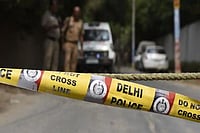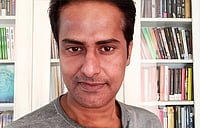
The CBI told the court (through the CPS) that Quattrocchi's name surfaced in 1993 when he appealed against letters of request issued by the Indian government to Swiss authorities for information on certain accounts suspected to be holding payoff money from the sale of Bofors howitzers to India. This money was moved frequently from one account to another. In June 2003, Quattrocchi transferred about three million pounds to the BSI-AG bank in London from an account in the Bahamas. It was a transfer that the CBI traced. It had clearly kept track of shady and layered transactions and transfers over a period of at least 10 years.
With some of the suspect money now in a London bank, even if Swiss-owned, the CBI moved fast to freeze that money. The order was obtained, subject to confirmation by a court ruling. In court later, the CPS argued that Quattrocchi was suspected of transferring funds received from AB Bofors from one account to another and from one jurisdiction to another to avoid detection, and that a portion of this money was now in the London branch of the Swiss bank.
The Indian government handed a letter to the court saying: "The aforesaid fact that accused Ottavio Quattrocchi has the aforesaid amount in above said bank accounts in United Kingdom leads to a reasonable suspicion that these funds form part of proceeds of crime relating to this case. It is therefore necessary to conduct investigation in United Kingdom to collect evidence both oral and documentary to ascertain the source of funds held by Quattrocchi in the said UK bank, beneficial ownership of the account and details of the transaction in the accounts." The letter asked the London court "to freeze the operation and restrain funds in accordance with the law of the land."
The CBI evidence offered earlier to the Delhi high court was forwarded to the London courts. This included a noting by a Delhi high court judge in 1999 that referred to a finding by a special judge. The special judge noted that he was satisfied there was prima facie evidence to show that Quattrocchi had received $7.123 million as kickbacks in the Bofors deal.
Quattrocchi contested the CPS move to secure the freezing of his account in the court. But this is what the London high court judge said in his judgement: "The material submitted on behalf of the Government of India demonstrates that (i) there is evidence to suggest that the defendant (Quattrocchi) received very substantial sums far in excess of the funds in issue as a result of his involvement in the allegedly criminal course of conduct, (ii) charges have been laid against him in relation to such conduct, (iii) the funds in issue represent part of the value of the proceeds of such conduct, alternately that it can be inferred that they are indirectly derived from the commission of an offence. In those circumstances, I am satisfied that there are reasonable grounds for thinking that an external confiscation order may be made at some stage in the Indian proceedings." He accordingly confirmed a freezing of the accounts.
Quattrocchi went in appeal before a three-judge bench. The three judges said in a ruling on January 20, 2004, that they agreed with the previous judgement "in every respect". Quattrocchi's appeal was dismissed. In withdrawing the case against Quattrocchi now, the Congress government has done for Quattrocchi what he had failed to do for himself, and what the London courts had denied to him. The CBI's painstaking and eventually successful tracking of suspect money through one jurisdiction after another, through one account after another over a period of 10 years has now come to nothing.
This reversal also negates the earlier success of the Indian government in the Swiss Cantonal Court in which both the Hindujas and Quattrocchi were named as the owners of the accounts into which the money had gone. The Hindujas appealed extensively to block Indian government moves to get access to certain code-named accounts in Swiss banks. So did Quattrocchi.

Last month, the government presented the court order in favour of the Hindujas as an alibi for also letting off Quattrocchi. CPS's Shane Nainappan wrote to Indian authorities, with a copy to additional solicitor-general B. Datta[the website adds on January 23: please see here for an update whichshows how the Hindujas judgement was manipulated by yet another U-turn bythe controversial ASG B. Datta - please scroll down to the bottom of the page ofthis timeline- Website Ed] on December 23, 2005: "I understand this conclusion was reached following the judgement of the Delhi high court on 31 May 2005 (re P.P. Hinduja v the State) and the opinion of Addl. Solicitor General of India Mr K.P. Pathak dated 7 October 2005, both of which have been endorsed by the Director of Prosecution, CBI. In light of the above, I am obliged to take the appropriate steps to discharge the restraint order. "
The CBI moves to track Quattrocchi's money and link them to the Bofors deal were backed by Swedish investigators. Indications of the howitzer contract link emerged from Bofors itself. The diaries of chief negotiator on behalf of AB Bofors, Martin Ardbo, record a crucial entry of a meeting with "Q" and with "Gandhi lawyer". A top Swedish police officer investigating the Bofors deal has said "Q" was Quattrocchi.
In an unusual statement that was published in The Asian Age last year, Sten Lindstrom, who described himself as "the principal investigator in the Bofors-India howitzer case", said the Bofors truth points to Quattrocchi. "Ottavio Quattrocchi, the Italian middleman who negotiated the political payoff through AE Services, must be interrogated," he wrote. "Sonia Gandhi must be questioned. All else is detail. It would not be wrong to say that I am probably one of no more than a handful of people, if not the only person, to have seen all the documents pertaining to the Bofors-India case. Sonia Gandhi must be questioned. I know what I am saying."
So must some people who pull the strings in government today. But if it was not the Hindujas, if it was not Quattrocchi, who was it? That illegal payments were made is not in doubt. The government has shown no signs that it wants to find an answer to that question. Sonia Gandhi, conveniently, does not have to answer because she is not prime minister.


























